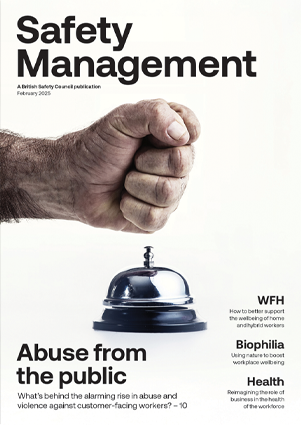The behaviours of line managers can have a positive or negative impact on employee health, wellbeing and engagement, so it’s vital managers get staff feedback on whether their management style is supportive or negative, and have regular check-ins so workers can raise concerns about their wellbeing.
Features
Why line managers play a vital role in workplace wellbeing
Line managers, team leaders, supervisors… it doesn’t matter how these positions are described in a business; anyone with people management or leadership components to their role could play a pivotal role in supporting the wellbeing of the organisation’s employees. Here, I use the phrase ‘line managers’ to describe these various people management positions and explore the value and impact these individuals can have on workplace wellbeing.
 Photograph: iStock/SDI Productions
Photograph: iStock/SDI Productions
A key link in the employee wellbeing chain is the supportive role that line managers play. Managing people, and supporting their wellbeing, is a big job – and an important one. Line managers are under considerable pressure in the current climate, and they will also be experiencing many of the same concerns as those they manage.
British Safety Council defines wellbeing as “an individual’s ongoing state which enables them to thrive”. Most people report that behaviours, relationships with line managers and toxic cultures are the biggest drivers of poor wellbeing at work. So, it is important for organisations to move away from providing wellbeing benefits in isolation and consider the causes of poor workplace wellbeing and the possible solutions.
The Chartered Institute of Personnel and Development (CIPD) says there are a number of areas where line managers can have a positive or negative impact on the employee experience at work and workplace wellbeing. These include the working environment, good line management, work demands, autonomy, change management, career development and employee voice.
Considering the influence that line managers have on the employee experience it is no surprise that management style features in the top three most common causes of stress at work, according to CIPD research. Although line managers have a key role in supporting employee wellbeing and engagement, it is reported they often lack the knowledge, self-awareness and behavioural skills to be good line managers and support the health, wellbeing and engagement of their teams.
For instance, according to the CIPD Health and Wellbeing at Work Report 2022, the majority of organisations require line managers to take responsibility for managing sickness absence but only 60 per cent provide them with training in handling absence. Furthermore, the CIPD report found that only 38 per cent of organisations agree that their line managers have the confidence to have sensitive discussions and signpost their team to expert sources of help when needed and only 29 per cent believe their line managers are competent to spot the early warning signs of mental ill health.
 Marcus Herbert is head of wellbeing at British Safety Council.
Marcus Herbert is head of wellbeing at British Safety Council.
Often, people in line management positions are promoted to these positions because of their technical knowledge rather than their people skills and leadership qualities. When this is combined with a lack of people management training, it’s a recipe for poor workplace wellbeing.
If we consider the kind of pressures that line managers are commonly under (as outlined by ACAS, 2016 – see graphic below) it is unsurprising that management style can have such a negative or positive impact on workplace stress.

To further illustrate the impact that bad line managers can have on workplace wellbeing, it has been documented that people with a bad manager have even worse wellbeing than those without jobs (Gallup, 2021), and that 75 per cent of people quit their job to “get away from their manager” at some point in their career (Gallup, 2015). Furthermore, a study of 3,122 male employees found that those who work for a bad manager were up to 60 per cent more likely to suffer a heart attack, stroke or other life-threatening cardiac condition (Nyberg, 2009).
Therefore, since a line manager’s behaviour and the culture they create in their team has a major impact on the employee experience of work (i.e. their health, wellbeing and engagement with their work and the organisation’s wider goals), organisations should be considering ways in which to better support and guide their managers. By improving their people management capabilities, managers can achieve better results by managing people well, improve their own wellbeing as well as that of their team, and benefit the organisation as a whole.
What can line managers do to have a positive impact on wellbeing?
The needs of each organisation and manager will vary depending on multiple factors but there are two key things line managers can do to have a positive impact on workplace wellbeing: get to know their team and establish how their leadership style is perceived by their team.
Research published in Wellbeing at Work – How to build resilient and thriving teams (Gallup, 2021) examined the relationship between the frequency of feedback from line managers with their team and considered any impact working remotely would have on the level of engagement. The authors found that regardless of the percentage of the working week spent working at a set location versus working remotely, the factor that resulted in the highest level of engagement was the more regular frequency of contact line managers had with team members (see ‘Frequency of receiving feedback from line manager’ graphic).

Therefore, factoring in regular touchpoints or meetings to catch up with team members and truly get to know how they like to be managed would be advantageous to both the line manager (due to the increased level of employee engagement) and their team members. Higher levels of employee engagement with their work are also associated with higher levels of workplace wellbeing.
In order to determine how well a leader is perceived by their team, the Health and Safety Executive (HSE) has developed a free ‘Line Manager Competency Indicator Tool’. This allows managers to assess whether they currently have the behaviours identified as effective for preventing and reducing stress at work, by helping managers reflect on their behaviour and management style.
On completion, the level of effectiveness is provided for four key areas: managing emotions and having integrity; managing and communicating existing and future work; managing the individual; and managing difficult situations. The score for each area is combined to provide a percentage score of either 75 per cent or below (development needed), 76 per cent to 89 per cent (reasonable), or 90 per cent and above (effective) to outline the manager’s competence in preventing, reducing and managing stress among their staff at work.
By getting to know their teams through regular touchpoints (at least weekly) as well as investigating how their leadership style is perceived, line managers can have a positive impact on the engagement, wellbeing and management of stress in their teams. However, line managers cannot simply address workplace wellbeing needs on their own – organisations have a bigger and wider role to play.
What could organisations do?
- Ensure leaders are aware of the wellbeing support available to them as well as their team
- Allow managers to allocate dedicated time in their working week to provide wellbeing support to their team members
- Encourage leaders to seek peer-to-peer support, or support from the HR team, so they know how to effectively support the health, wellbeing and engagement of their team
- Provide training, support and expert guidance for leaders on how to support their teams – if leaders have the skills to support the wellbeing of their team this will also minimise the impact on the leader’s own wellbeing; for instance, preventing people management issues arising in the first place will avoid the need for leaders to spend time and energy dealing with them
- Recognise the work of leaders in supporting their team’s wellbeing through inclusion in objectives and key performance indicators
- Raise awareness among senior leaders (such as directors) who manage other leaders (such as line managers and supervisors) on the importance of proactively supporting the wellbeing of the leaders who report to them.
Although providing training on how to support the mental health of employees is an important part of developing line managers’ people management skills, in September 2022 the World Health Organization (WHO) published a set of guidelines on this and stated that “such training, however, is not designed for managers to become mental healthcare providers. Managers cannot – and should not – be in a position to diagnose or treat mental disorders after such training.”
Marcus Herbert is head of wellbeing at British Safety Council.
For information on the Being Well Together programme see:
References
CIPD Health and Wellbeing at Work Report 2022, tinyurl.com/4v5hynxn
Wellbeing at Work – How to build resilient and thriving teams, (Gallup, 2021), tinyurl.com/y56ny569
Line Manager Competency Indicator Tool, HSE, hse.gov.uk/stress/mcit.htm
Line Manager Support Materials, CIPD, cipd.org/uk/topics/line-manager-support
Guidelines on mental health at work (WHO, 2022), tinyurl.com/3uxkfpcb
FEATURES

How Building Information Modelling can improve the management and delivery of occupational safety and health
By Manuel Tender, Digital4OSH on 07 February 2025
Building Information Modelling has traditionally been used to develop and share digital information, plans and 3D models for the efficient design and construction of buildings and other physical assets, but it also holds huge promise for ensuring the safety of construction projects, from the design phase through to the management of the build itself.

Adaptability, ergonomics and wellbeing: building blocks for the workplace in 2025
By Guy Osmond, Osmond Ergonomics and Alex Reffell, Osmond Inclusive Wellbeing Services on 04 February 2025
Employee expectations around the nature and organisation of office, home and hybrid working have changed significantly in recent years, making it more important than ever for employers to rethink and update their approaches to flexible working, ergonomics and workplace design, to better support employee wellbeing, motivation and job satisfaction.

Supporting wellbeing across the flexible extended workplace: why we need a different approach
By Andy Lake, Flexibility.co.uk on 04 February 2025
Flexible working has been shown to offer numerous benefits, from improved employee wellbeing to greater productivity. But the rapidly changing nature of work in a digital age means employers need to take a strategic, joined-up approach when implementing flexible working practices, if they are to fully realise the benefits.



